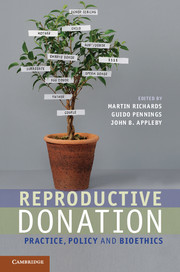Book contents
- Frontmatter
- Contents
- Contributors
- Acknowledgements
- 1 Introduction
- 2 The biology of donation
- 3 Ethics for reproductive donation
- 4 Parenthood – whose right is it anyway?
- 5 Reproductive donation
- 6 UK and US perspectives on the regulation of gamete donation
- 7 Gamete and embryo donation
- 8 The legal and ethical regulation of transnational donation
- 9 Balancing ethical criteria for the recruitment of gamete donors
- 10 Challenges in intra-family donation
- 11 ARTs and the single parent
- 12 Reproductive donation and justice for gay and lesbian couples
- 13 Is disclosure in the best interests of children conceived by donation?
- 14 Identifiable donors and siblings
- 15 Ethical issues in embryo donation
- 16 Reproduction through surrogacy
- 17 Some conclusions regarding the interaction of normative and descriptive elements in reproductive donation
- Index
- References
4 - Parenthood – whose right is it anyway?
Published online by Cambridge University Press: 05 August 2012
- Frontmatter
- Contents
- Contributors
- Acknowledgements
- 1 Introduction
- 2 The biology of donation
- 3 Ethics for reproductive donation
- 4 Parenthood – whose right is it anyway?
- 5 Reproductive donation
- 6 UK and US perspectives on the regulation of gamete donation
- 7 Gamete and embryo donation
- 8 The legal and ethical regulation of transnational donation
- 9 Balancing ethical criteria for the recruitment of gamete donors
- 10 Challenges in intra-family donation
- 11 ARTs and the single parent
- 12 Reproductive donation and justice for gay and lesbian couples
- 13 Is disclosure in the best interests of children conceived by donation?
- 14 Identifiable donors and siblings
- 15 Ethical issues in embryo donation
- 16 Reproduction through surrogacy
- 17 Some conclusions regarding the interaction of normative and descriptive elements in reproductive donation
- Index
- References
Summary
The question of who should be parents is age-old. Until about thirty years or so ago, it was directed almost exclusively to those who could conceive without medical assistance. Today, with the advance of new technologies of assisted reproduction, the question regularly applies to many more, including all those who are infertile, do not have a partner of the opposite sex, are single or for other reasons can only reproduce with medical help. Judgements about who should be parents tend to be different depending on which of these groups one belongs to: while there are frequently very few – if any – restrictions for persons who can conceive without medical help, individuals who seek such assistance are often viewed with some suspicion with respect to a variety of features, including their sexual orientation, mental health, age or their marital and financial status.
For such unequal treatment to be justified, one would have to show that the two groups of people are indeed different in a morally relevant way, that is, with regard to their ability to parent. There are two kinds of differences that may come to mind: (a) the possibly dissimilar consequences of comparable treatment, and (b) the type of people who might be included in these groups.
- Type
- Chapter
- Information
- Reproductive DonationPractice, Policy and Bioethics, pp. 51 - 69Publisher: Cambridge University PressPrint publication year: 2012
References
- 2
- Cited by

